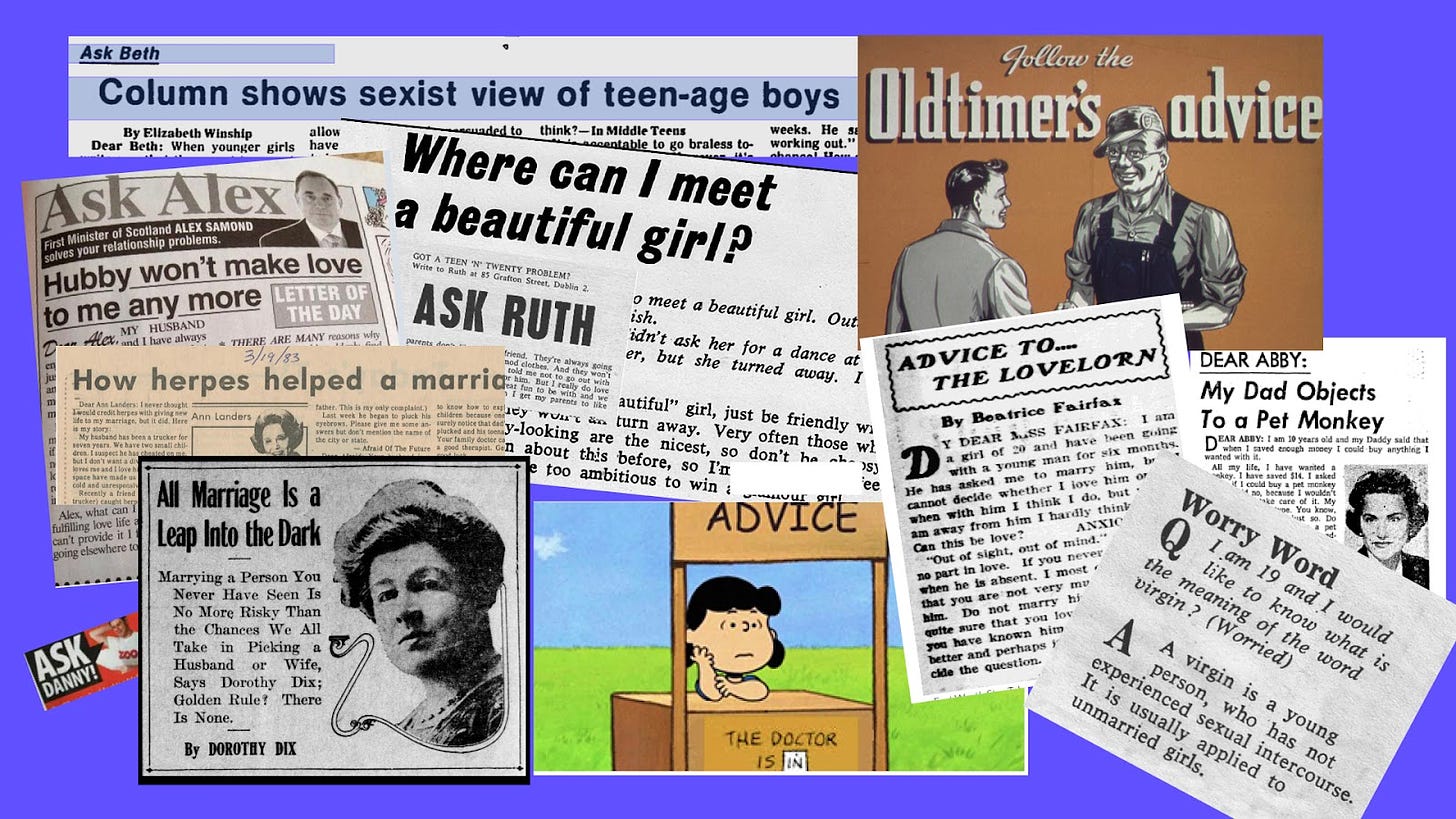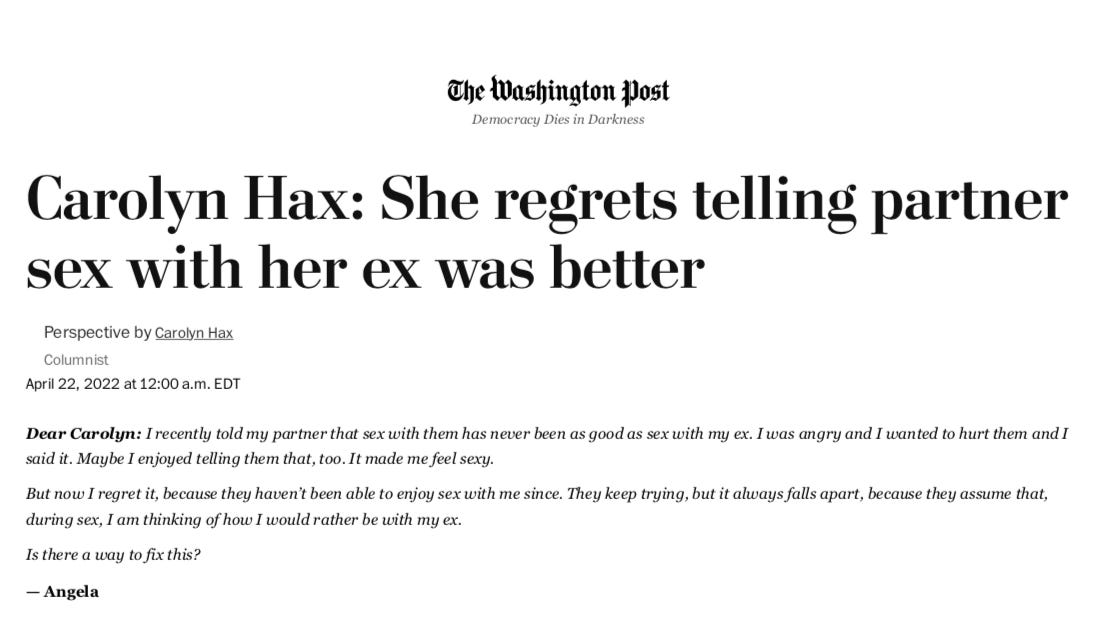Before we begin…
Dear Reader: Have you ever, like me, sent a letter or email to an advice columnist and waited hopefully to see your name and carefully-selected alias appear? Do you shun advice columns or devour them? I graze. I sometimes worry that I am a not-so-closeted voyeur, eager to feed on the dilemmas of others for reasons that are in no way noble. Why do so many people pour out their problems to complete strangers and why do so many people think they have the answers? And is it art? - Feeling Slightly Guilty in San Diego
Welcome! You’ve reached Spark. Learn more here or just read on. If you received this from a friend, please join us by subscribing. It’s free! All you have to do is press the button below. If you have already subscribed, welcome back! If you see something you like, please hit that heart so others can find us more easily. Also, if this email looks truncated in your inbox, just click through now so you can read the whole thing in one gulp.
Where to Turn? There are just so many writers ready to help
Advice Columns. Turns out they are among the most reliably perennial of literary life forms which makes sense since everyone involved from the reader who sends a letter (or email or tweet), to the advice giver are writers. They give rise to fiction, nonfiction, and movies and feed some part of me that doesn’t bear close inspection. Take this recent example from Carolyn Hax:
When I saw it, I abandoned the front page of the Washington Post and clicked on the headline, safe and happy in the knowledge that I was neither one of the parties involved but shamefully curious. I mean, who would DO that???
Advice, a never ending well of inspiration
The attraction of advice columns has produced a peripheral but crowded genre of writing about advice writing. Weeks after getting the idea for this newsletter, I am still digging my way out from under an avalanche of articles, book lists, images, and social media threads full of shared posts with extra reader commentary rating the value of that day’s advice. Like this:
Advice columns stimulate all kinds of stories from all kinds of people, including fake ones. Turns out, you can make this stuff up. Bennet Madison who wrote 25 fake letters for SLATE’s “Dear Prudence” column, got 12 published, and then stopped when Tucker Carlson used one on his show. His confession was published in GAWKER.
I wish I’d figured that out when I was 15, eager to be published on any terms, even ones that might prove potentially problematic at home should my aliases fail me (Not Too Young, Sick of Small Town Life). Unfortunately, my problems weren’t up to snuff for Dear Abby or perhaps she never saw my letters among the 15,000 letters she usually received each week. I don’t blame her, my problems were so boring I can’t even remember what they were. Undoubtedly something to do with my mother or sex or my on-again, off-again boyfriend. My sense of drama often outshadowed reality. That didn’t stop me from tearing open the newspapers for weeks in search of my letter which is precisely what Abby and her publishers counted on.
Like the writer in this piece from Book Riot, I was an avid reader of advice columns during my teenage years. They were windows into adulthood with glimmers of stories about sex, marriage, infidelity, romance, friendship, work, just plain life. I found them in all kinds of magazines and newspapers – the ones I was allowed to read and the ones I had to filch and hide to pore over later with my friends: Playboy, Hustler, True Confessions. There were stories in those letters, what author Carol Shields once referred to as little scraps of narrative that fueled my imagination and challenged my ability to empathize – great training for the writer in me trying to get out.
As I grew older, I developed opinions and, unfortunately, premature confidence in those opinions. Ask any one of my friends or relations and they will tell you about a time I presented them with an analysis of their problem complete with recommendations and a dash or two of judgment when all they’d asked was please pass the wine (my urge to share advice increased proportionately with each glass of wine).
I love problems. Especially those of other people. Which is why I still read advice columns and spout my opinions in my kitchen where only I can hear them. In real life, I have been humbled by the years and the dawning realization that my opinions are not necessarily what friends and relations seek from me. In fact, most wish I would just shut up and listen.
But all the writers are doing it
Advice-giving can be such a win-win-win for a writer and those who publish them. I see so many people giving advice out there without any special qualifications. Total strangers reach out to Carolyn Hax, Amy Dickinson, Roxane Gay, Cheryl Strayed, and John Paul Brammer. None of them and very few of their forebears had training in psychology (Dr. Joyce Brothers being one of the famous few who did). They were writers looking for a home, an income, an audience. All of these have written books. Some had published novels first, others just focused on their own real-life stories. Their followers add to the bottom line of the Washington Post, The New York Times, and any number of syndication services that provide content for newspapers around the nation. A whole host of newly minted advice writers have tried or are trying to find readers to help right here on Substack.
The question is, why do so many of us write to advice columnists? Why do so many of us read them? Why do the “agony” pages, as they were once called, draw us?
We may, as this article in the Observer holds, read these columns because we are “starved for connection” but that is not the whole of it. Maybe some of us are starved for attention - a sense that we and our messy lives are worthy of someone who cares, even if that person makes a living from them. Maybe some folks are exhibitionists. Then there are those of us who read the story of a bad breakup like those who watch the Indy 500 and feel horror when a crash unfolds, but also relief that it happened to someone else. And most of us still have opinions that we feel strongly about even if we’ve learned not to share them outside our kitchens.
I look at the paragraph I just wrote and realize that it reflects an edge of cynicism or at least skepticism. What’s that all about? Haven’t I also read advice columns and felt a surge of recognition with the plight of a person who was brave enough to share it, albeit anonymously? Yes. Yes, I have. And I’ve been stunned sometimes and deeply touched by the careful, open, and empathetic replies. And isn’t human connection ultimately at the center of every story ever written or told?
Funnily enough, it was a piece of fiction that really got me thinking about the complex needs of those who seek advice and those who have assumed the burden of responding. “The Best of Betty” by Jincy Willett was one of my favorite stories in her collection, Jenny and The Jaws of Life. I remember laughing when I first read it but when I saw this short film adaptation made from it, I remembered the edge of pain running beneath the surface and how, in the end, I was struck by the open-hearted love for flawed humans everywhere, including those who are charged with giving them advice. It reminded me that, whether we are in the advice business or not, we all hold each other’s lives in our hands. Perhaps the most enduring and universal bit of advice we can offer each other is “handle with care.”
What About You?
What is your relationship with advice columns? Take the poll below and then let me know your experience as a writer or a reader of advice lit.
Highlights From the World Of Advice Lit
If you are entering a trivia contest or just want to know…
This list of the “Best Advice Columns” from 2019 is a fabulous list with a rundown on the work of each columnist and highlights to make navigating to the advice you need swift and entertaining. Here’s another take on the best columns online from Rachel Rayner.
Here are 11 Books to Read if You Love Advice Columns (Bustle) and here is a review of a book about the early days of British Agony Aunts who founded the genre (don’t you love the title?): Never Kiss A Man in a Canoe.
This farewell message from Cheryl Strayed and Steve Almond, who helmed the Dear Sugar podcast and New York Times advice column “The Sweet Spot” shares their insights into the Art of Giving Advice (in case you are inspired to write your own column someday).
If you are a Sherlock Holmes fan you already know that the famous fictional detective often turned to the “agony” pages to hunt for his next case. This podcast talks about that and more.
These advice columnists prescribe literature as medicine from the New Yorker
If you need a specialist on…
Sex - How to Do It from Slate and In Bed With Gigi for Thrillist.
Senior Sex - Dr. Helen of Leisureworld and Joan Price
Work - Roxane Gay Work Friend in NYT and Karla Miller at WaPo “weekly advice on workplace dramas and traumas.
Cats - Ask Pammy
Dogs - The Bark
Optometry (you never know!) - The AOSA Advice Column
Ethics (don’t we all run into the ethical buzzsaw from time to time?) - The Humanist Advice Column and The Ethicist (New York Times)
If you need a celebrity with their own Substacks…
Amanda Palmer: Ask Amanda
Heather Havrilesky: Ask Polly
Cheryl Strayed: Dear Sugar
E. Jean Carroll: Ask E. Jean
And now for something completely off topic: sploot
Word of the week: Sploot - it’s what you do when you need to cool down and you don’t care what it looks like to anyone else. It’s what I’m doing as you read this. Let’s each write a sentence using the word sploot and leave it in the comments. I mean, why not?
My Heartfelt Thanks
Thank you very very very much for your kindness and understanding last week. Your comments and “likes” went a long way to easing the frustration I experienced last Friday. I’ve found a work-around for my technical issues and was able to save some important documents so we are back on track.
Welcome, New Subscribers!
Welcome to each and every new person who has joined us in the past week. It’s thrilling to find so many new folks on board each day. If you would like to check out past issues, here’s a quick link to the archives. Be sure to check out our Resources for Readers and Writers too. And help us spread the word by sharing Spark with your friends. Oh, you can find most of the books discussed here on the Spark Community Recommendations Page of bookshop.org where each sale supports local bookstores and generates a commission that right now is too small to even mention but if it ever gets any bigger, we will make plans to spend it together.
That’s it for this week. Let me know you are and what you’re reading. If there’s an idea, book, or question you’d like to see in an upcoming issue of Spark, let us know! Use the comment button below or just hit reply to this email and send your message directly.
And remember, If you like what you see or it resonates with you, please take a minute to click the heart ❤️ below - it helps more folks to find us!
Ciao for now.
Gratefully,
Betsy
P.S. And now… your moment of Zen: Serenity Now
A long-ago trip on the Green River and a moment of peace from Spark Community member Greg J.
Calling for Your Contribution to “Moment of Zen”
What is YOUR moment of Zen? Send me your photos, a video, a drawing, a song, a poem, or anything with a visual that moved you, thrilled you, calmed you. Or just cracked you up. This feature is wide open for your own personal interpretation.
Come on, go through your photos, your memories or just keep your eyes and ears to the ground and then share. Send your photos/links, etc. to me by replying to this email or simply by sending to: elizabethmarro@substack.com. The main guidelines are probably already obvious: don’t hurt anyone -- don’t send anything that violates the privacy of someone you love or even someone you hate, don’t send anything divisive, or aimed at disparaging others. Our Zen moments are to help us connect, to bond, to learn, to wonder, to share -- to escape the world for a little bit and return refreshed.
I can’t wait to see what you send!









Oh, the irony of me publishing one of my periodic “Hey Lyle” advice column pieces today
Today’s headline across the Ask Annalisa column in Life section of The Guardian: ‘ I constantly feel hurt and let down by friends who never show any interest in me’. Do you really need to know more?
A question you might care to ask is what advice did you receive when young that has helped you avoid agony aunts?
In my case: 1) Never get involved with someone at work because when it goes wrong they will gang up on you. 2) Never get involved with someone who has more problems than you and… 3) Never marry someone you haven’t been to the bed with. Sadly, I ignored the last one but at least by my example I have saved my children and grandchildren from the same mistake.